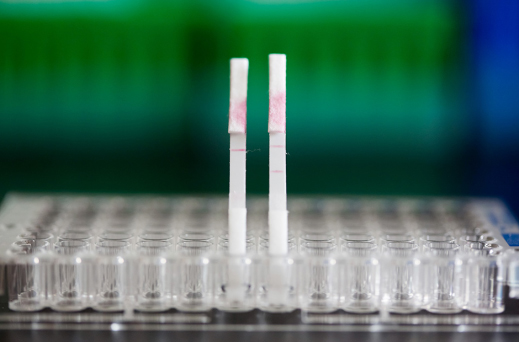Cancer-Detecting Yogurt Could Replace Colonoscopies
A spoonful of yogurt could soon offer a cheap and simple way to screen for colorectal cancer.

Sangeeta Bhatia, a professor at MIT, is working to replace costly and uncomfortable colonoscopies and MRIs with a helping of yogurt followed by a urine test—a cheap method that could improve the early diagnosis of colorectal cancer.
Bhatia is developing synthetic molecules that can be introduced into the body via yogurt, and will interact with cancer in a way that produces telltale biomarkers. These molecules can then be detected easily when passed in urine.
Bhatia previously developed nanoparticles that find their way to tumors, and are then broken into smaller pieces by enzymes produced by the cancer. The broken up particles are small enough to be collected and concentrated by the kidneys, after which they are excreted.
The first iteration of the technique involved the use of lab instruments to analyze urine and find the telltale markers. Now Bhatia has developed a paper-based urine test—like the one you’d use for pregnancy. So far this test has been demonstrated in mice for colorectal cancer and liver fibrosis.
The nanoparticle work, described in a paper earlier this year, requires an injection (see “A Paper Diagnostic for Cancer”). In new, as-yet-unpublished work, Bhatia is developing a way to deliver the nanoparticles by modifying a type of bacteria found in yogurt. The bacteria produces the nanoparticle biomarkers by interacting with a tumor.
Bhatia hopes the approach will “transform diagnostics,” and says she’s in the process of forming a company to commercialize the approach. Because the test requires no specialized equipment, it will be particularly helpful in poor countries, she says, where few people are currently screened for common cancers. But it might also replace or augment colonoscopies.
If detected early, 90 percent of people with colorectal cancer survive for at least five years. But only 40 percent of people are diagnosed early, partly because so few people get screened, according to the American Cancer Society.
Samuel Sia, a professor of biomedical engineering at Columbia University, says Bhatia’s synthetic biomarkers are an “interesting concept” for providing easy and inexpensive cancer tests. He adds that nanoparticle injections have shown good reliability—at least in mice. But without data from clinical trials, he says, “I wouldn’t say this is the solution yet.”
Keep Reading
Most Popular
Large language models can do jaw-dropping things. But nobody knows exactly why.
And that's a problem. Figuring it out is one of the biggest scientific puzzles of our time and a crucial step towards controlling more powerful future models.
How scientists traced a mysterious covid case back to six toilets
When wastewater surveillance turns into a hunt for a single infected individual, the ethics get tricky.
The problem with plug-in hybrids? Their drivers.
Plug-in hybrids are often sold as a transition to EVs, but new data from Europe shows we’re still underestimating the emissions they produce.
Stay connected
Get the latest updates from
MIT Technology Review
Discover special offers, top stories, upcoming events, and more.